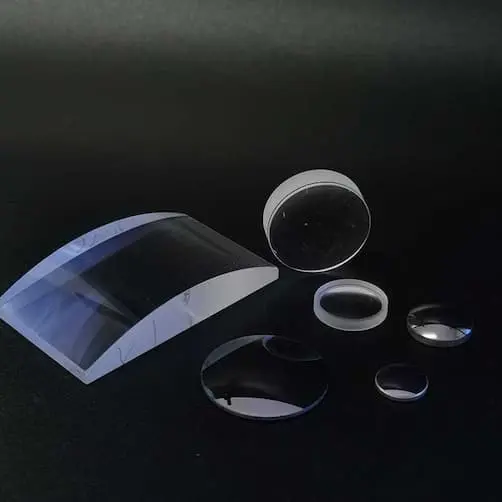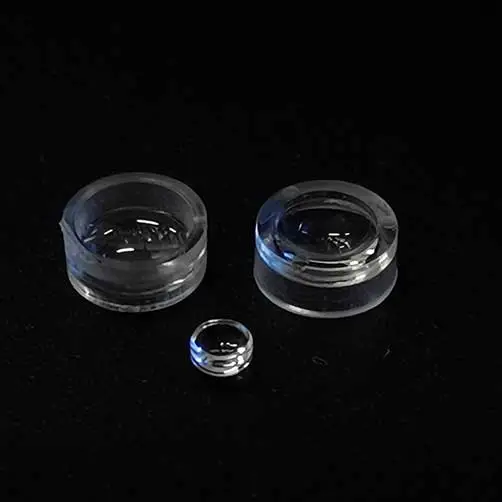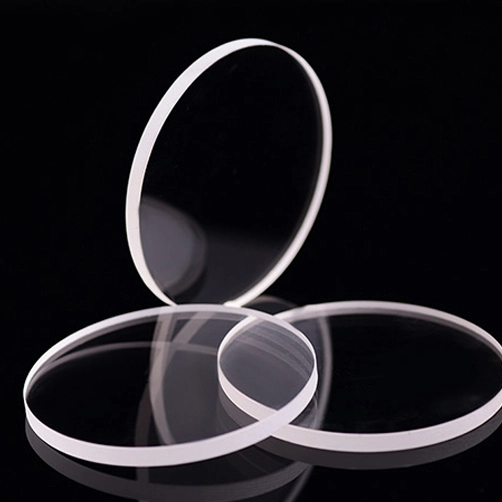Our aspheric lenses have surface profiles that are not portions of a sphere or cylinder, making them highly sought after in photography. Aspherical lenses include an aspheric element, and TC Optics is dedicated to producing lenses with surface form error within 100 microns. If you're wondering about aspheric lenses cost or the meaning of aspherical lens, contact TC Optics for more information.
Material | BK7, B270 or PYREX |
Diameter Range | 10-300 mm |
Diameter Tolerance | +0.00/-0.15 mm |
Center Thickness | +/-0.5% |
Focus | +/-7% |
Aspheric lens Face Form | Checked by Caliper |
Surface Finish: Processing Surface | x: λ/2; y: 2λ |
Aspherical Lens Standard Products
Part No. | Material | EFL | OD1 | OD2 | CT | ET |
TCA101 | B270 | 18.51 | 24 | 10.4 | 1.54 | |
TCA102 | PYREX | 37.1 | 50 | 23 | 2.5 | |
TCA103 | PYREX | 36.4 | 52 | 24 | 2 | |
TCA104 | B270 | 74.47 | 35 | 30.68 | 10.05 | 2.3 |
TCA105 | PYREX | 48 | 50 | 19 | 2 | |
TCA106 | PYREX | 61.78 | 68.5 | 24.12 | 2 | |
TCA107 | B270 | 6.25 | 6.5 | 2.679 | 0.942 | |
TCA108 | PYREX | 126.57 | 75 | 14.25 | 2.8 | |
TCA109 | B270 | 190.1 | 80 | 15.24 | 3.8 |
Aspheric lenses are optical that have a non-spherical surface that allows them to have a flatter profile and a wider field of view. They have become increasingly popular in eyewear due to their numerous advantages over traditional spherical lenses. That said, there are still some disadvantages to consider when deciding whether aspheric lenses are right for you.
Advantages:
Improved vision: Aspheric lenses provide better visual acuity, especially in peripheral vision. The reduction of distortion and spherical aberration can significantly improve sharpness and clarity, reducing eye fatigue.
Thinner and lighter: Aspheric lenses are designed to reduce the curvature of the lens, resulting in a flatter profile. This means that they are thinner and lighter than traditional lenses, allowing for more comfortable and stylish eyewear.
Wide range of applications: Aspheric lenses are used in many different industries, including photography, aerospace, and medicine. They are also available in a variety of materials such as polycarbonate, high-index, and Trivex for durability and improved optics.
Disadvantages:
Higher cost: Aspheric lenses are often more expensive than traditional spherical lenses, particularly when it comes to high-index glass lenses.
Specific design requirements: Because aspheric lenses have a more complex design, they require more precise measurements and calculations to create. This can increase the cost and potentially limit the options available from certain eyewear manufacturers.
Limited availability: Aspheric lenses may not be available in every prescription or frame shape, potentially limiting the options for some people.
While there are some disadvantages to using aspheric lenses, the benefits are often worth the additional cost and effort. Aspheric lenses from professional optical manufacturing company can provide improved visual clarity, comfort, and style, making them an excellent choice for many people.
Spherical and aspherical lenses are two types of lenses that have different shapes and optical properties. Sphere lenses have a curved surface that is the same curvature throughout, like a part of a sphere. In contrast, aspherical lenses have a more complex shape with varying curvatures, which helps to correct for various types of distortion and aberrations.
One of the main advantages of aspherical lenses is that they can reduce image distortion and other optical aberrations. Spherical lenses can cause several types of distortion, including spherical aberration, coma, and astigmatism. Aspherical lenses can eliminate or reduce these distortions, leading to sharper images and better image quality.
Aspherical lenses also have a flatter profile compared to spherical lenses, making them lighter and more comfortable to wear. They can be particularly useful in eyeglasses as they can reduce the "bulge" in the center of the lens that is typical with spherical lenses.
On the other hand, spherical lenses are generally cheaper and easier to manufacture, making them the preferred choice for some applications. They are also more widely available and can be used in a broader range of devices, including cameras, telescopes, and eyeglasses.
In conclusion, aspherical lenses provide a higher level of optical performance, especially in correcting optical aberration, while spherical lenses are more affordable and have a broader range of applications. Ultimately, the choice between aspheric and spherical lenses depends on the specific requirements of the device or application in question.
Q: What does aspherical camera lens mean?
A: An aspherical camera lens is a type of lens that has a non-spherical shape, typically used in cameras to reduce distortion and improve the optical performance of the lens. Its unique shape results in improved image clarity and better overall image quality.
Q: Aspherical lens vs normal lens?
A: Aspherical lenses have a non-spherical shape, correcting distortion and improving image quality. Normal lenses have a uniform curvature and can lead to image distortion and aberrations.
Q: Types of aspherical lens?
A: There are several types of aspherical lenses including digital aspherical, double aspherical, plastic aspherical, and high-index aspheric lenses. Each type has unique benefits and is designed for specific applications.
As one of excellent optical component manufacturers in China, TC Optics brings in hot briquetting technology from Japan to ensure volume production ability. Trust TC OPtics for your optical lenses wholesale needs.
If you would like to build your own precision optical products or request a quote, please click one of the two buttons below. Otherwise, please fill out the form below with any questions or concerns.

Address
No. 946,Chaoyue street,High-tech zone,Changchun city,Jilin
Call Us
+86-431-84563660


